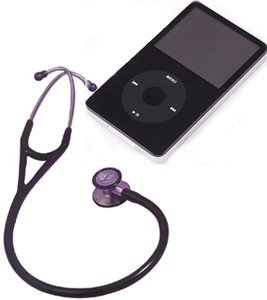
Dr Michael Barrett, clinical associate professor of medicine and cardiologist at Temple University School of Medicine in Philadelphia, and his colleagues studied 149 doctors who listened 400 times to five common heart murmurs for 90 minutes on iPods.
After the 90 minutes of ‘listening drills’, the participants were getting an average identification success rate of 80 percent. Other research studies show that the average doctor identifies 40 percent of heart sounds through the stethoscope.
Improving doctors’ listening skills when using a stethoscope reduces diagnosis error rate and the dependence on expensive equipment and tests, the researchers said.
The heart sounds on the audio file are interspersed with explanations about the visual diagrams. Dr Barrett explained that listening to the heart sounds accompanied by new explanations about familiar pictures, enhanced retention and increased recognition skills.
According to Dr Barrett, Temple University now uses heart song to help all its medical students improve their stethoscope skills. Tests on heart listening are taken each year during their training, and since the programme was introduced they now achieve a 90 percent recognition rate compared to 20 to 30 percent of the general medical student and residents population.
There are various places on the Internet offering medical multimedia packs or downloads to improve heart sound recognition skills.
Dr Barrett’s heart songs are available in various forms and a typical download price is $0.99 per audio file. There are also CD-packs for basic, intermediate and advance level training.
A heart murmur is an extra sound or an alteration in the sound of the heartbeat. Most of them are harmless (innocent murmurs), but sometimes they can indicate, with other symptoms, that something is wrong with the way the blood is flowing into, out of or within the heart.
Abnormal flows occur when a heart valve leaks or narrows or when blood vessels in or around the heart develop problems.
